Pickup Trucks 101: 10 Common Fuel Questions

Pickup truck owners can choose from a variety of fuels, each of which works differently in a pickup. Not sure which fuel is best for your truck? Read on for the answers to common questions about fuel.
What Does the Octane Rating Indicate?
A fuel’s octane rating measures how much that fuel can be compressed before it auto ignites. Preignition, when gasoline ignites before the spark plug fires, can cause significant damage to an engine. When a truckmaker calls for a certain octane level, that is the level at which the engine will run without preignition issues. Higher-octane gas can withstand preignition at higher pressures, which is why many turbocharged engines require 91-octane fuel. While using a higher-than-recommended octane rating won’t hurt an engine, it also usually won’t provide any additional benefits for most vehicles. For old or heavily worn engines, or if a pinging sound can be heard from the engine, running higher-octane fuel may extend the life of the engine.
What Octane Rating Should I Use?
Some engines may ping or pre-ignite under heavy loads but run fine otherwise. If this is the case, running higher octane when towing or hauling could be beneficial. If your truck uses diesel, this is a nonissue for you. Diesel engines don’t pre-ignite because they inject fuel at the time of combustion.
What Is Ethanol?
Ethanol fuel is a renewable fuel source made from corn or grain. It can be found at many fuel stations and is prevalent in the Midwest; a notice at the fuel pump will say that the gasoline contains up to 10 percent ethanol. Pure ethanol has an octane rating of 110, so adding this to gasoline is an easy way to increase the octane rating. Some stations even offer an E85 selection; that fuel is 85 percent ethanol.
How Does Ethanol Affect My Engine?
A vehicle needs to be properly equipped to run E85. Flex-fuel vehicles are designed to handle both E85 and regular gasoline. Without getting too complex, E85 has a much lower air-to-fuel ratio than gasoline, meaning that it requires more ethanol than gasoline for proper combustion. It also has roughly 20 percent less energy per gallon than gasoline, which means running ethanol will lower gas mileage noticeably. On the flipside, with E85 more fuel is injected to get the proper air-to-fuel ratio, and it has other properties that allow an engine to make more power. To run E85, the fuel must be injected in different amounts into the engine. In addition, other system changes are needed to protect the fuel system hoses and connectors. On the plus side, ethanol can dissolve deposits in the fuel system, which can clog the tiny ports in a carburetor. When using a carbureted engine, it is best to use ethanol-free gasoline whenever possible.

What Is Biodiesel Fuel?
Like ethanol, biodiesel is made from renewable energy sources such as cooking oils and fats. Biodiesel has less energy per gallon than standard ultra-low sulfur diesel fuel, but only about 7 percent less. B20 (meaning 20 percent biodiesel and 80 percent standard diesel) is the most common application of biodiesel, and it only loses 1 percent energy compared to standard diesel fuel. Biodiesel is biodegradable and won’t contaminate soil or water if spilled.
How Will Biodiesel Affect My Engine?
Biodiesel and B20 have reduced emissions over standard diesel fuel, which is a big plus for the environment. Biodiesel has better lubricating properties and can extend injector and engine life over standard diesel fuel. Like ethanol, biodiesel is a better solvent than the standard fuel. For vehicles with existing deposits in the fuel system, switching to B20 from standard diesel can cause fuel filters to clog as it loosens and dislodges deposits. While this isn’t a major problem, it does require the fuel filter be replaced more often. Biodiesel can be used in most modern diesel engines, but always check the owner’s manual to be sure. The additional solvent properties of biodiesel can damage some rubber components and seals. If the vehicle isn’t listed as being B20 compatible, stick with standard diesel fuel to avoid damage.
What Does Top Tier Mean?
The “top tier” fuel designation was first implemented in 2004 for gasoline and fall of 2017 for diesel. A fuel rated as top tier signifies that the fuel meets requirements for minimum detergent and maximum deposit levels under specific test conditions. For owners, that means the fuel they are purchasing won’t cause excessive deposit buildup over time. Top tier is independent of the octane ratings of gasoline. Purchasing top-tier 91-octane gasoline over top-tier 89-octane gasoline won’t provide more cleaning power since they both meet the same test requirements. Top-tier diesel fuel has similar inherent properties, but it also improves lubricity, stability and protection against water. Using top-tier fuels keeps an engine significantly cleaner than using non-top-tier fuels. This reduces the need for fuel additives to clean the engine and increases engine life.

Should I Use Fuel Additives?
There are a variety of fuel additives available for gasoline and diesel engines. Depending on the vehicle make and model, driving habits, environment in which the vehicle is operated, its age, fuel type used and many other factors, a fuel additive may be needed. There are additives that help prevent diesel fuels from gelling at low temperatures and additives that clean carbon deposits in the injectors, increase octane ratings, increase storage life and decrease corrosive properties. Some additives can be mixed together and used at the same time, while others should be used separately. Additives may improve fuel mileage, reduce rough idling, increase power and extend the life of fuel. For vehicles in moderate environments, fuel additives should be needed only occasionally to keep the engine running at its best. Vehicles used in harsh environments or that sit for long periods of time may need additives more often. Fuel additives have been known to damage engines when used improperly, so be sure to follow instructions when using additives for a pickup.
How Long Does Fuel Stay Usable?
For engines that aren’t used regularly, or are only used seasonally, it is important to take proper care with fuel storage. Generally, gasoline should be used within one month of purchase, but it can last six months when stored properly. Diesel fuel should also be used within one month if possible but can last up to 12 months with proper storage.
What’s the Best Way to Store Fuel?
If you don’t drive your truck regularly, keep the fuel tank 95 percent full to allow for expansion and contraction. If you need to store fuel for your pickup, it’s imperative to use a proper airtight container that has a little space for expansion but not so much that there will be a lot of water condensation. Fuel containers should be stored in a cool place that’s out of the sun. Also, different additives have different recommendations for storage. Be sure to check local safety regulations about fuel storage to make sure you’re not storing it improperly or in excessive amounts.
If you have any further questions about fuel, feel free to list them in the comments section below and if our readers don’t have the answer, we’ll be sure to chime in. Also, let us know about any fuel-related issues you might have had. Have you had any positive or negative issues with additives? Have you experienced your vehicle not starting due to gelled diesel fuel? Do you have fuel solutions we haven’t mentioned here? Let us know so we can all gain from each other’s experiences.

Cars.com’s Editorial department is your source for automotive news and reviews. In line with Cars.com’s long-standing ethics policy, editors and reviewers don’t accept gifts or free trips from automakers. The Editorial department is independent of Cars.com’s advertising, sales and sponsored content departments.
Featured stories



